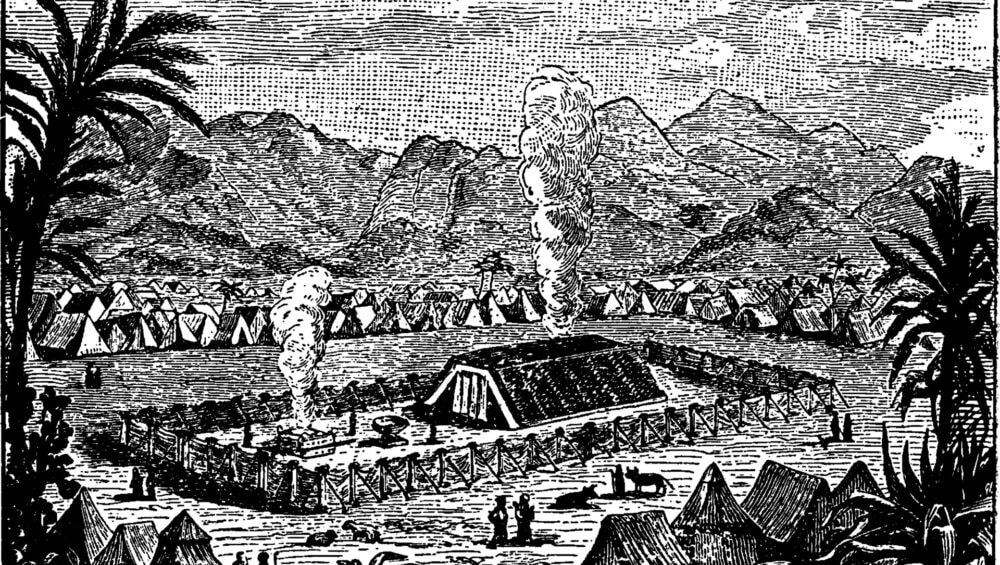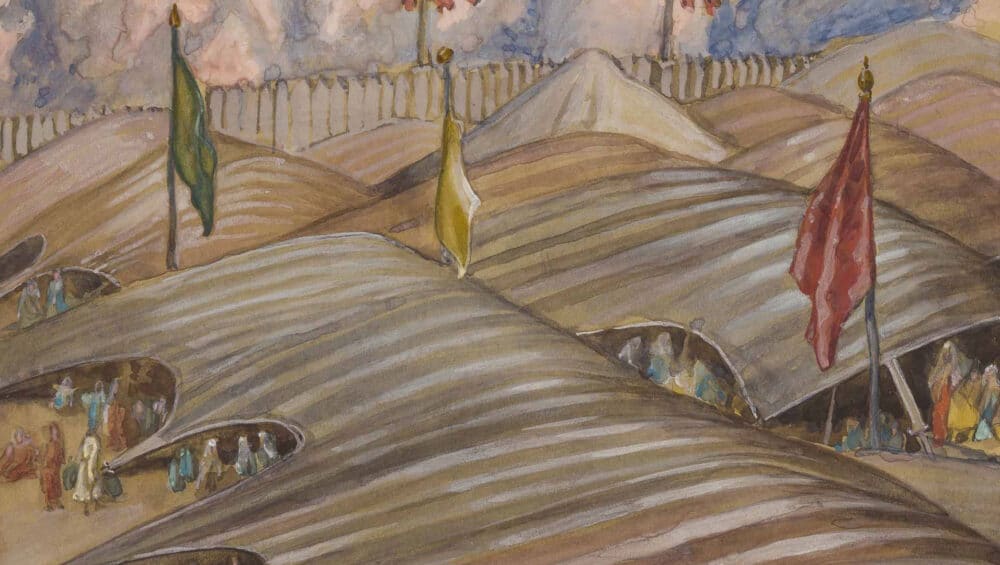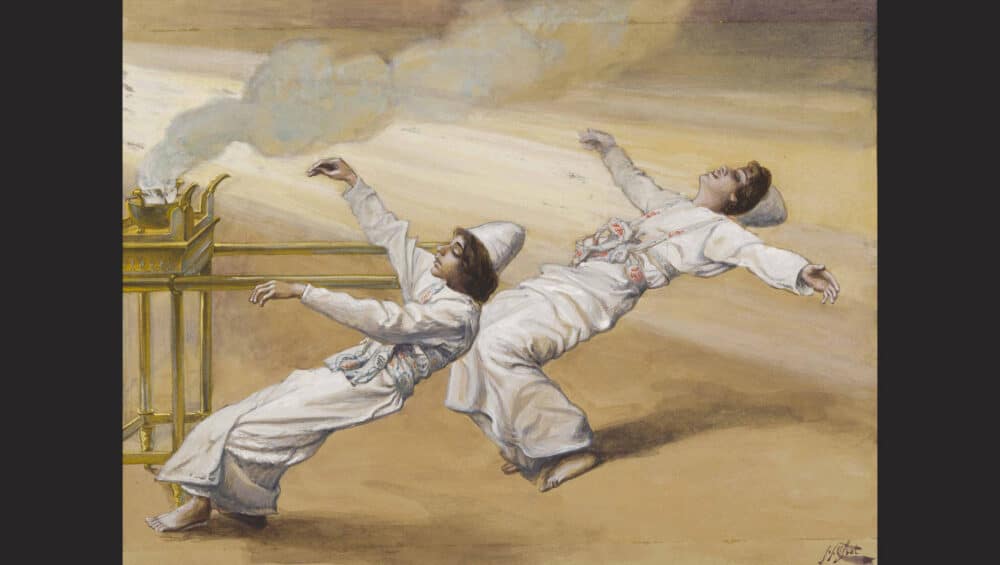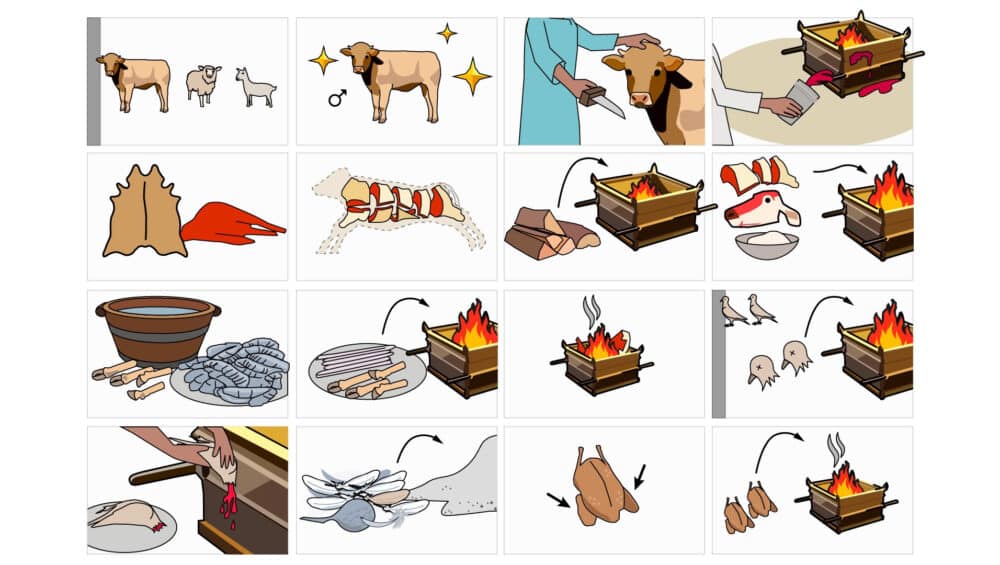Welcome to Livin’ Light’s Bible-In-A-Year challenge of discovering God’s love for us and His purpose for our lives. Here is the format for this great adventure: The daily reading assignment is posted at 5 a.m. After each day’s reading, Leigh An Coplin, the blog host, shares observations and poses questions about difficult passages to Rob Fields, who studied Christian Education at Asbury Seminary and currently teaches Biology in the Orlando area. To start from the beginning, click on 365 Bible Readings and scroll down to Day 1. The reading schedule is taken from The One Year Chronological Bible NLT.
Today’s Reading
— Leviticus 23:1-25:23
(1445 BC) Click here for a timeline of the whole Bible.
Questions & Observations
Q. (Leviticus 23:3): I have never heard of the term “holy assembly?” Is it a church service of some sort?
A. While it is the first time that term has been used, I think, the concept is well established. The Sabbath is a time for gathering with the community for the purpose of worshipping God. The people would have gathered at the Tabernacle, and then later the Temple. As the Jews became spread out among the various nations over the centuries, called the Diaspora, and it became harder to worship directly at the temple, worship sites called synagogues arose in the various cities. These synagogues will play a major role in the NT story of Christ and the first Christians. There are numerous references to Jesus observing Sabbath in a synagogue (Mark 3:1 among many), and Paul sought converts in the various cities that he visited on his first missionary journey in Acts (9:20).
Q. In all of these sacrifices, God is so specific. With Abraham and Jacob, they would occasionally stop and honor God with a sacrifice, but I don’t recall that God told them what to sacrifice. I wonder if people ever gave their best as an offering, but with no instructions from God. Why couldn’t the people come up with their own sacrifices/offerings?
A. That’s a good question, and I guess I don’t have a great answer. My guess would be that the Law was designed to tell the people what was expected of them, as a way to standardize the sacrifices. The sacrifices were part of the Law that is being established here, so part of the reason we don’t see Abraham and Jacob doing things in that way is because they were not under that system. We are basically laying the ground rules for a relationship with God that has lasted more than 3500 years.
Q. (23:21): This verse caught my eye. God said to not do “ordinary” work on the Sabbath. What does that mean?
A. I would take it at face value: stop the routine work that you are doing to keep these various holidays. Even if the exact phrase hasn’t been used before, I would take the meaning to be the same.
Q. (23:27): On the Day of Atonement, the people were supposed to “deny themselves” or fast. Growing up, I don’t remember our church talking about fasting. Maybe I just wasn’t paying attention to that part. I know some congregations of believers will fast for a certain thing they are praying for. Why is fasting a way of worshipping? When I think about fasting, I think STARVING. If I am hungry, I can’t think straight. How can I worship and concentrate on God when I can’t concentrate? The NT promotes fasting too, right?
A. Fasting is a method of self-denial for the purpose of growing closer to God. We intentionally deny ourselves food in order to focus on God. As Jesus tells us, and Satan, in Matthew 4: there is more to life than food, and sometimes it takes us giving up our nearly constant routine of eating to bring our attention to this fact. Part of the reason it can be so hard to fast the first time is simply because our body isn’t used to it. Fasting is a discipline, one that both Jews and Christians alike have prescribed as a way to grow closer to God for millennia.
[Quick aside: the notion of giving up something for Lent [our current Church season] has become fashionable in many churches, but on some level I feel our self-denial misses the point. While there is value, say health-wise, in giving up chocolate or soda for a season, that is not the original intent of a Lenten fast. The idea is that we set something we enjoy aside for a time, in order to spend the allotted time WITH GOD. So having no Coke for 40 days may help your waistline, but unless you are spending your soda break time reading scripture or in prayer, you’re not really “filling” the time in the way that Lenten fasts were originally designed to.]
Book recommendation: If you want an excellent guide to fasting and prayer, as well as the other classical Church disciplines, I recommend Richard Foster’s Celebration of Discipline. It is a modern classic (written in 1978), an incredible guide to the spiritual life of a Christian, and frankly, a book that people will likely be talking about and reading 100 years from now.
O. (23:9-44): This is just a bulleted form of the festivals:
Firstfruits: First cuttings of harvest.
Harvest (Pentecost): Fifty days after Firstfruits, a second offering from the first of their crops.
Trumpets: A complete day of rest in the fall.
Atonement: Day of purification through fasting, nine days after the Festival of Trumpets.
Shelters: Five days after Day of Atonement to remind future generations of Israelites that God made their ancestors live in shelters when He rescued them from Egypt.
Q. (Leviticus 24:21): I guess this backs up the “Thou shalt not murder” commandment by saying, hey, if you do, you die too!
A. That would be the proper application of an eye for an eye in this case. Sadly, some states and nations just haven’t managed to make it any further than that.
O. (25:1-7): I grew up on a Kansas farm. I remember my father letting our land lie fallow to restore it’s nutrients. I think it’s amazing how the Bible covers all the little things that may seem trivial, but very important to livelihood.
Q. (25:8-13): Do Jews still recognize the Year of Jubilee?
A. That’s a tricky question. Most of the information I read indicated that most rabbis feel that the rule of Jubilee only applies within the Promised Land in a kingdom established by God. Therefore, the answer most commonly given is that most Jews, even Torah observant Jews, do not mark Jubilee: it only applied to a particular era of their history when it was needed.
On the other hand, there is the concept of tracing the years through the ages, which you could argue is “recognition”. I couldn’t find a definitive source about the attempts to keep track of Jubilee: some scholars have attempted to recreate a list of the years that should have been Jubilee, and also, some rabbis feel that there should have been one 50 years after the modern state of Israel was established, but most did not. There have been various attempts by Jewish scholars to track, and therefore project, when the next Jubilee is, but this is mostly scholarly speculation that has little bearing on the life of Jews today.
O. (25:14-17): Sounds like Real Estate 101 to me, or a fair real estate transaction!
For more knowledge
— Is there scientific benefits to letting the land rest? https://blog.freshharvestga.com/why-soil-needs-as-much-rest-as-we-do/
— How does letting the land rest look today? https://www.israel21c.org/the-farmers-who-are-giving-their-land-a-years-rest/
Shop: Jesus showed his disciples how to love people. By following Jesus, we can increase the Kingdom of God. https://livinlight.org/product/teacher-t-shirt/
Tomorrow’s reading: February 25:24-26:46










